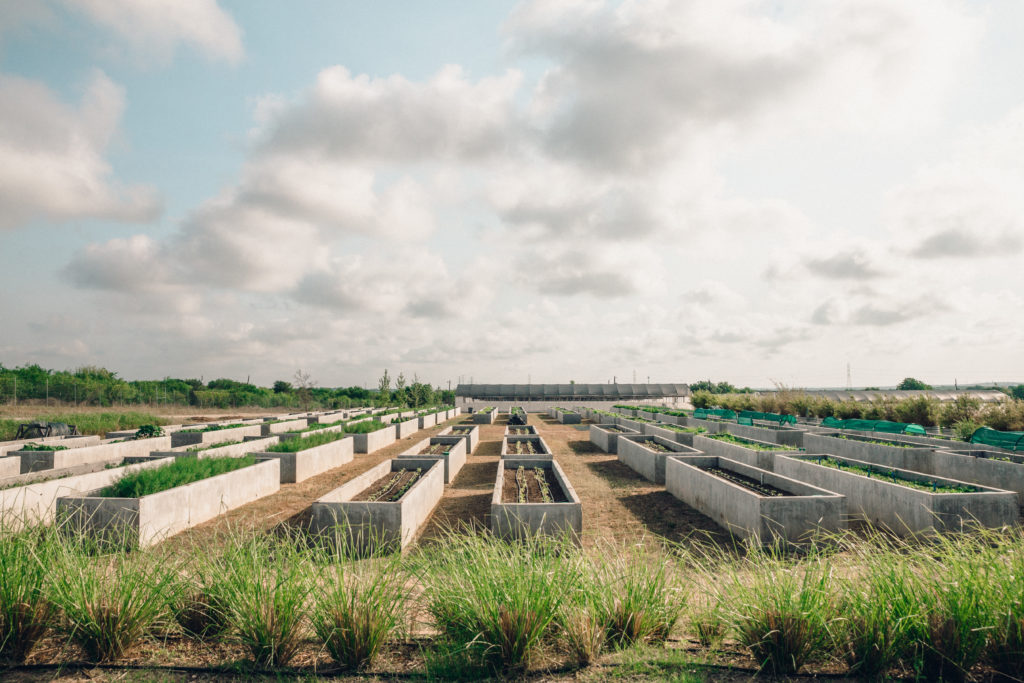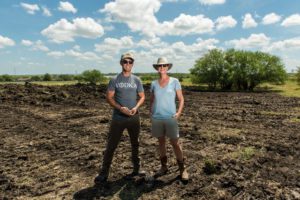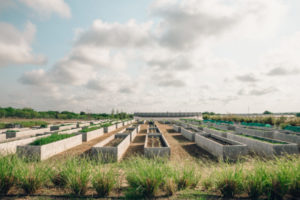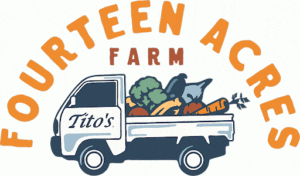

Jan 5, 2023Fourteen Acres’ bounty
In an unusual combination, central Texas distillery Tito’s is growing fresh produce, and seeks to inspire other distilleries to do the same.


Tito’s, Austin, Texas, officially introduced Fourteen Acres Farm in August to ensure its employees have fresh and healthy food and to encourage healthy eating. Up until then, Fourteen Acres was operating behind the scenes, growing on 74 raised beds and 16 high tunnels.
Seven farmers cultivate more than 30 items at the farm, including artichokes, broccoli, Napa and red cabbage, carrots, cucumbers, eggplant, mixed baby greens, kale, kohlrabi, romaine, spinach and sugar snap peas.
Originally, employees received fresh fruits and vegetables through a company farm share program. Fourteen Acres now serves as a weekly farmers market, where they can select their produce and connect with farmers to learn recipes, cooking tips and how the food is grown.
Worms to the rescue
In 2021, Fourteen Acres added vermiculture – the use of worms to decompose organic food waste into nutrients. That fall, the farm began making bio-complete compost, started an in-house soil lab and began conducting crop trials with more fruit, beginning with strawberries.


“The addition of vermiculture is incredibly important, as it heavily influences nutrient cycling and increases resistance to pests, diseases and pathogens,” said Kathleen Kuper, farm director. “It also assists with better root growth and nutrient absorption. Additionally, the liquid amendments help with foliar feeding and support pest and fungus control.”
Soil health remains critical for Fourteen Acres.
“Soil health is important because, like the popular saying goes, ‘You are what you eat,’ and that holds true for plants, too,” Kuper said. “The healthier our soil is, the better yield we’ll see with our crops. By establishing an in-house soil lab, we’ll know how to best balance our soil to make it as healthy as possible, improving our ability to grow. Conducting crop trials allows us to be better farmers and produce better crops for our employees to enjoy.”
Crimson clover, millet and sorghum are some of the cover crops Fourteen Acres plants to help plant growth by preventing soil and wind erosion. The cover crops also help improve soil and feed the microbiome. Blooming cover crops feed bees and encourage pollination of the crops, which also include yellow and Zephyr summer squash, butternut, acorn, spaghetti, kabocha and tetsukabuto winter squash.


Because it manufactures its own inputs, Fourteen Acres remarkably hasn’t experienced major difficulties acquiring herbicides, fertilizers, insecticides and fungicides.
“Because we’re a sustainable farm, we can easily make and acquire what we need,” Kuper said.
Tunnel protection
Challenges remain, however.
“The biggest challenges we face in growing are the wind, soil and water, as well as pests, disease and weather,” she said. “In recent years, Fourteen Acres worked to cultivate the soil and developed a rainwater collection system.”
“The high tunnels help with crop production by extending our growing season, as well as protecting our crops from the wind and flooding,” Kuper said.
Additionally, shade cloths on the high tunnels provide sun protection.


Fourteen Acres uses a regenerative farming philosophy.
“Stewardship and sustainability are core to our regenerative farming philosophy, through which we focus on giving back to the earth as we take from it,” Kuper said. “We want Fourteen Acres Farm to be long-lasting, so taking care of and regenerating our soil, land and water gives longevity to the farm.”
Other items grown at the farm include heirloom, cherry, slicers and green tomatoes, a variety of peppers, melons and potatoes. Fourteen Acres sources avocados, mangoes, grapefruit and oranges from nearby organic farms.
Part of community support is Tito’s Love, Tito’s Block to Block, a national program. Inspired by Fourteen Acres’ success in supplying its workers fresh produce, the program works with nonprofits to identify gardens, farms and growing spaces that could benefit from Tito’s’ financial and physical support.


In addition to improving community gardens and farms in Los Angeles, Phoenix, Arizona, Detroit, Michigan, Portland, Oregon, and Richmond, Virginia, Tito’s plans to construct growing spaces in New York City, Denver, Indianapolis, Salt Lake City and in other U.S. cities. In Kansas City, Missouri, the program revitalized a community garden by constructing more than 40 raised beds, which increased the ability of community gardeners to grow produce for their families.
“We wanted to take what we learned in our own backyard and use that to give back to our communities all across the country, increasing access to fresh, healthy foods, and bringing people together – one block at a time,” Kuper said.
-By Doug Ohlemeier, Assistant Editor
TOP PHOTO: Tito’s Fourteen Acres Farm, a part of an Austin, Texas, distillery, grows a wide range of vegetables.
Photos courtesy Tito’s Fourteen Acres Farm














